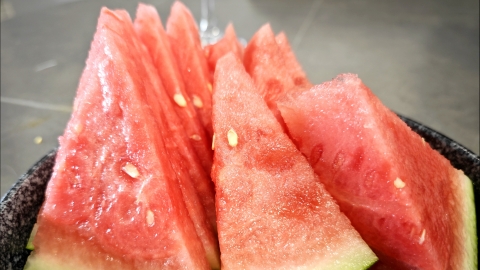Can I eat watermelon if I have excessive dampness?
Generally speaking, whether a person with excessive dampness can eat watermelon depends on the type of dampness and the amount consumed. Those with damp-heat constitution may consume small amounts, while those with cold-damp constitution are advised against eating too much. Detailed analysis is as follows:

Watermelon is cold in nature and sweet in taste, with high water content, and has the effect of clearing heat and relieving summerheat. For individuals with a damp-heat constitution, who may experience symptoms such as bitter taste in the mouth, yellow and greasy tongue coating, and sticky stools, eating a small amount of watermelon can help alleviate internal heat and replenish fluids, generally without worsening discomfort. However, excessive consumption might irritate the gastrointestinal tract due to its cold nature, leading to symptoms such as abdominal distension and diarrhea, which could in turn affect the elimination of dampness.
Individuals with a cold-damp constitution often exhibit symptoms such as sensitivity to cold, cold limbs, and loose stools. Eating too much watermelon may intensify internal coldness, impair the spleen and stomach's yang energy, and affect the spleen's function of transforming and transporting dampness, thereby worsening dampness accumulation. Additionally, watermelon contains relatively high sugar levels; consuming large amounts on an empty stomach may stimulate gastric acid secretion and cause stomach discomfort. Therefore, eating watermelon on an empty stomach should be avoided.
In daily life, individuals with excessive dampness should control their watermelon intake according to their individual constitution. Those with a damp-heat constitution can combine watermelon consumption with heat-clearing foods such as mung beans and winter melon, while those with a cold-damp constitution should consume more warming and spleen-strengthening foods such as ginger and Chinese yam. At the same time, maintaining moderate physical activity can help regulate the balance of dampness in the body.







